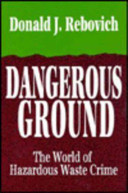
Dangerous Ground
By - Rebovich, Donald J.
Floor
-
Floor 1
ISBN 10 - 1560000147
ISBN 13 - 9781560000143
Book Status
-
1 Qnty Available with us.
Shelf No
-
19
Call Number
-
364.142 REB
Physical Description
-
xv, 168 pages ; 24 cm
Notes
-
Includes index